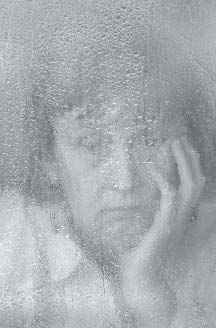Lesson 3: Sociocultural Causes of Abnormal Behaviour
Post-traumatic Stress Disorder
Pose traumatic stress disorder (PTSD) develops after a trauma occurs that was either experienced or witnessed by the patient. It involves the development of psychological reactions related to the experience such as recurrent, intrusive and distressing recollections of the event. These may be in the form of nightmares, flashbacks and/or hallucinations. The individual may also suffer from depressive symptoms or clinical depression, substance miss-use, and avoidance behaviors.
Video: Post-traumatic Stress Disorder
Stress Response
In figure 7.1, see a graph showing the stress response that affects humans not suffering from PTSD. Note that within days or weeks, the stress response resolves itself and goes back to the normal level.
Figure 7.1: Acute Stress Response
In figure 7.2, see a graph showing the stress response of an individual that suffers from PTSD. Look at the peak of the graph. You will notice that weeks or months after the stressful event, the body is still impaired by symptoms of the stress response.
Figure 7.2: Post-traumatic Stress Disorder
Dr. Stan Kutcher, www.teenmentalhealth.org
Case Study 2
|
Description Upon her return home, the woman felt depressed and was unable to return to work due to fear of leaving her apartment. Her symptoms then intensified when her original claim was rejected. She had little interest in doing anything but cooking and cleaning. She felt safe at home, but she became apprehensive when going out. She noted that she did not know why she was apprehensive, but that she did feel better when her husband accompanied her as she did her local errands. When they had to travel to different neighbourhoods, however, she became afraid that his payes (long curled sideburns) and ethnic garments (they were Orthodox Jews) would attract hostile attention from non-Jews. She complained of nightmares regarding her experiences in a concentration camp over forty years ago and found herself dwelling on those memories during the day. The preoccupation was so intense that she was unable to concentrate on activities such as reading. The woman had been an active, competent, and content person before the fire, but she did not understand the cause of all the problems that occurred after the fire. She had often thought about how she would be different if the war had not happened, but she claimed that it was not a major preoccupation for her. When speaking with the psychiatrist, she revealed that she was interred in Auschwitz (a concentration camp) in 1943 at the age of 17. She had been selected for a work crew, told to undress with hundreds of other women, and shoved into a strange-looking empty hall without windows. The room had an odd odour. When the women were eventually transferred to a different part of the camp a few hours later, she learned that the room was a gas chamber. The woman began to cry when she realized that the smell of the burnt synthetic fibres brought back the memory of the gas chamber. This woman’s account is an example of Delayed Type of Post-traumatic Stress Disorder. The smell of the burned synthetic fibres triggered a re-living of her Auschwitz experience, but she was unaware of this until her conversation with the psychiatrist. |
Diagnosis This woman’s account is an example of Delayed Type of Post-traumatic Stress Disorder. The smell of the burned synthetic fibres triggered a re-living of her Auschwitz experience, but she was unaware of this until her conversation with the psychiatrist. The characteristic symptoms of this disorder are obvious: the stress of being in a concentration camp is definitely outside the range of usual human experience. The trauma is revisited in the form of nightmares, anxiety, and distressing memories. She now avoids situations that remind her of the trauma, has difficulty sleeping, and has lost interest in her usual activities. On Axis IV, the severity of the stress is catastrophic. Although the stressor noted in this Axis usually occurs within the year before evaluation, this is an exception to the rule. The DSM summary is as follows: Axis I: Post-traumatic Stress Disorder, Delayed Type, Severe Note: Workers’ Compensation agreed to full compensation after the psychiatrist sent the evaluative report.
|
 A Jewish woman was referred to a psychiatrist for evaluation as part of an appeal regarding a rejected claim from Workers’ Compensation. The married 59 year-old was working as a seamstress when a small fire broke out in the factory and some synthetic fabrics began to smoulder. The fire was quickly extinguished, but not before the fabrics burned, leaving an unpleasant acrid smell. After the fire, the women developed abdominal pain, nausea, and heart palpitations. She was even hospitalized because her physician wanted to rule out a heart condition or asthma. She was released, however, because no evidence of organic pathology was found.
A Jewish woman was referred to a psychiatrist for evaluation as part of an appeal regarding a rejected claim from Workers’ Compensation. The married 59 year-old was working as a seamstress when a small fire broke out in the factory and some synthetic fabrics began to smoulder. The fire was quickly extinguished, but not before the fabrics burned, leaving an unpleasant acrid smell. After the fire, the women developed abdominal pain, nausea, and heart palpitations. She was even hospitalized because her physician wanted to rule out a heart condition or asthma. She was released, however, because no evidence of organic pathology was found.